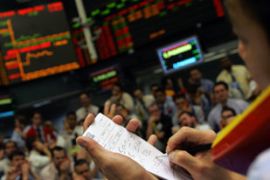US intervenes to calm markets
Federal Reserve injects billions into banking system to stabilise stock prices.

| “It’s that unnerving effect of the unknown which is spooking investors at the moment” Henk Potts, analyst at Barclays Stockbrokers |
At the end of a turbulent day on Friday analysts said the chaos had been a crisis rather a catastrophe.
After years of booming house prices and cheap credit – interest rates have been historically low – the US housing market is now in reverse with loans becoming more expensive and prices falling.
This has caused high numbers of defaults and repossessions as borrowers, particularly high-risk borrowers, struggle to keep up with their repayments.
After several weeks of turmoil on world stock markets due to the mortgage crisis, fears appeared to recede earlier this week.
But on Thursday, French banking giant BNP Paribas spooked the market when it said it had suspended three investment funds exposed to the US housing market because it was unable to value the assets.
A short time later the European Central Bank pumped a record 94.8 billion euros into the money supply – far more than it had injected in the aftermath of the September 11, 2001 attacks – and followed up with another 61.05 billion euros on Friday.
US liquidity injection
Before Wall Street opened, the Fed pumped $19bn in a market operation that was conducted more than an hour before its usual time.
It also took the unusual step of making a statement after the first operation – the first time it’s done so since the September 11, 2001 – in an attempt to calm investors’ fears.
By late morning, $16bn had been injected in a second market operation – an unusual occurrence for a Friday.
The last time the Fed conducted two operations on a Friday was more than two years ago.
A third injection of three billion dollars was pumped into the system late on Friday.
US stock indexes sharply cut their morning losses after the Fed’s second liquidity injection, which occurred shortly before 1500 GMT.
In a rare statement after Friday’s first market operation, the Fed said it would provide liquidity as needed “to facilitate the orderly functioning of financial markets”.
World market slide
Several other central banks around the world pumped lesser amounts into their banking systems.
But stock markets continued to slump across the world, with volatile US markets moving sharply lower before rebounding late in the day.
“It’s that unnerving effect of the unknown which is spooking investors at the moment,” Henk Potts of Barclays Stockbrokers in London said.
Banking stocks were among the worst hit.